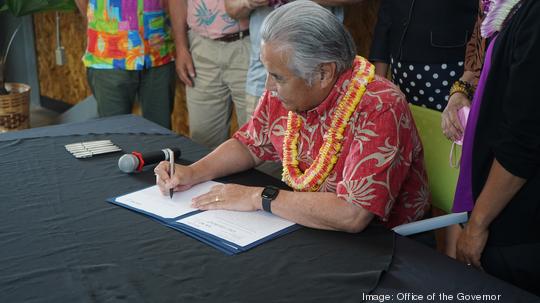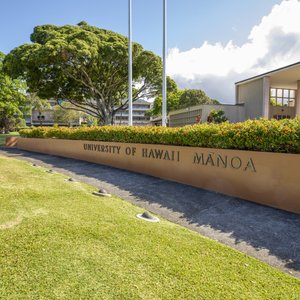
A package of bills that aim to improve digital access across the state are now law.
Gov. David Ige signed four bills into law on Thursday in an effort to “address the digital divide.”
“One thing that came through loud and clear [during the pandemic] … [is] the notion that for those who are not connected and don’t have access, they are significantly hampered from full participation in our communities and in our economies,” Ige said during a bill signing ceremony held Thursday at co-working space Entrepreneurs Sandbox. “We know that we have to work harder to ensure digital equity for everyone.”
The bills include:
Senate Bill 2076, which will create a Broadband Working Group, as convened by the University of Hawaii and the Hawaii Broadband and Digital Equity Office. The purpose of the group will be to develop the structure to operate, maintain and oversee broadband assets.
Ige executed a line-item veto, however, to cut the federal funding appropriation of $200 million. During the bill signing ceremony, he explained that he vetoed this item because funds from the Coronavirus State Fiscal Recovery Fund of the American Rescue Plan were “over-appropriated.” He said the state is “looking at other mechanisms that we need to execute in order to fund the things that our community needs,” and noted that other federal funds will be available for broadband.
Senate Bill 2214 appropriates $75,000 to create a digital literacy program for Hawaii public libraries, including making digital tools accessible to individuals with disabilities.
“We do believe that Senate Bill 2214 would allow us to expand programs and ensure that the public libraries can be a community space that provides access to the digital universe,” Ige said.
Senate Bill 2184 appropriates nearly $7.1 million to establish a Digital Learning Center within the Department of Education, with the goal of delivering virtual learning services to students statewide. The funding will go toward staffing, equipment and operations.
“The pandemic taught us that we can go 100% virtual for education, as well as 100% in-person,” Ige said. “ … We do know the future of public education here in the state does include the digital version, the virtual version, and the in-person version — and for our students, we need to be able to fashion an education program utilizing the full range of options.”
Senate Bill 2479 will require any public housing and state low-income housing facilities built or reconstructed after January 1, 2023, to include broadband infrastructure that’s accessible to all units.
During Thursday’s ceremony, Burt Lum, strategy officer for the state’s broadband initiative, noted that “the connective tissue in all of [the bills] is, how do we enable our communities to really gain a better foothold in the digital economy?”
“This is just the start, but it is a really great start for all of us in moving in this direction,” he said.



